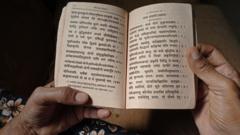In a fascinating twist of history, an American food aid program significantly expanded the literary landscape in U.S. universities. The PL-480 initiative, also known as the Food for Peace program, was established in 1954 during a period of tense Cold War diplomacy. It allowed countries like India to purchase U.S. grain using local currency, with India being one of its largest beneficiaries during a time of critical food shortages.
Ananya Vajpeyi, a historian and former doctoral student, reflects on her experience with the University of Chicago's Regenstein Library, which boasts one of the largest collections focused on South Asian studies. With over 800,000 volumes, the library stands out among global collections, a treasure trove that owes its existence to the PL-480 program.
The initiative not only provided food but also financial resources directed at U.S. universities to enrich their library collections. Through these funds, institutions acquired local books, periodicals, and media in various Indian languages. A significant share of this collection was sourced by a Delhi-based team set up in 1959, growing the collection substantially by the late 1960s. With over 750,000 titles shipped from South Asia, it made American libraries vital hubs for research on the region.
Critics, however, question the lasting impact of this program on South Asian literary resources. Todd Michelson-Ambelang from the University of Wisconsin–Madison cautions that such programs may create knowledge gaps by relocating resources to Western institutions, necessitating travel for researchers from India to access the materials.
Interestingly, many volumes acquired during this era, still bearing marks of the PL-480 program, are now considered archival treasures in Western collections. In contrast, Indian libraries often face preservation challenges, limiting access to these crucial resources. Vajpeyi suggests that while such exchanges have resulted in valuable acquisitions, they also highlight persistent disparities in access.
As the PL-480 program came to an end in the 1980s, the financial responsibility shifted to American universities, prompting a significant increase in their spending for continued South Asian material acquisitions. The evolution of this bibliographic exchange, initially driven by necessity, underscores ongoing discussions around colonial legacies, academic access, and the preservation of cultural heritage within a global context.






















